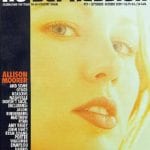Pops Farrar – An old folk singer lays it down
Those seeking a further understanding of Jay Farrar’s pungent, elliptical poetry will find no clear answers in the work of his father, James Paul “Pops” Farrar. Rather, they will discover a different kind of artist altogether, a wise and weathered vagabond dreamer, a sweet and salty singer of low dives and high seas.
Born on Christmas Eve 1930 in Salem, Missouri (in the Ozark foothills), Pops had music in his blood, and learned early the seductions and hardships a love for music can bring. His mother played church hymns on the piano, his father played speakeasies. “What little food we ate,” says Pops, “we got from his guitar. There was nothing between that guitar and our starving to death.”
Pops himself took to the oceans and rivers, hooking up with the Merchant Marine, and to this day he thanks the Roosevelt administration (which created the civilian but uniformed organization) for giving him the opportunity. “It was right wing socialism,” he says with obvious pride, “not this give away, throw away crap we have now.”
In addition to forming his headstrong political convictions, the peregrine Merchant Marine life let Farrar stroll streets and haunt taverns from Europe to Korea to the South Pole, soaking up the eclectic variety of tunes on his new CD, Memory Music: Songs And Stories From The Merchant Marine, which features German drinking songs, a Venice carnival number, cowboy ballads, spirituals, blues, and even Pops reading a bit of Turkish poetry.
For the most part, Pops backs his wobbly but warm voice (think Ramblin’ Jack Elliot after a pack of unfiltered cigarettes, or Townes Van Zandt on a Bourbon binge) on accordion, concertina, harmonica, pump organ, and chainsaw, with varying degrees of proficiency. But this record is not about technically perfect music. It is about what producer Chris King calls the songster spirit: “The songster is not looking for authenticity, he really isn’t looking for anything; he just has a tune stuck in his head and a harmonica in his hand and many miles to go before he sees another port.”
King wisely gives Pops room to ramble, letting him introduce and punctuate many of the 36 brief tracks with spoken-word reminiscences, putting songs such as “Inchon Harbour” in historical context, and adding crusty charm to renditions of traditional numbers such as “Railroad Bum” and “Shall We Gather At The River” (which also features St. Louis spoons wizard Fred Friction on a loving but drunken sing-along).
This loose, say-what-you-feel production allows for a rich and rewarding intimacy between artist and listener. Indeed, Memory Music has the feel of a perfectly calibrated day of drinking, singing, and swapping stories with old, close friends at a favorite dive.




